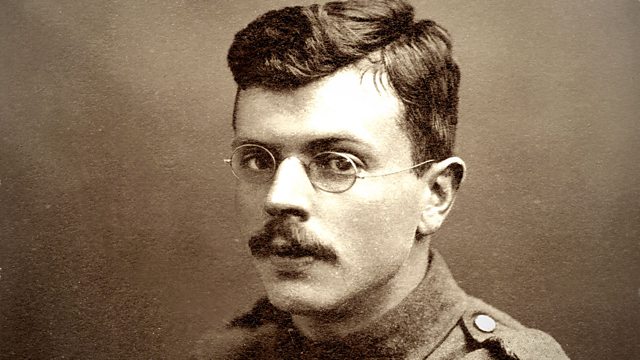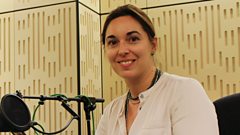
No Escape
Donald Macleod focuses on Ivor Gurney's final years, marked by time spent in confinement for his increasing mental instability.
Gurney's loyal friends offer small relief from the agony of his continuing confinment.
It's a story that begins full of possibility and hope; Gurney was one of the brightest musical lights of his generation. He imagined himself as Schubert's heir; a fresh, young genius whose music and poetry would revolutionise British society. Donald Macleod discovers how that early promise came to fruition and then unravelled, as Gurney struggled with the horrors of World War One and serious mental illness. Gurney expert, Dr Kate Kennedy, joins Donald to uncover the man behind the tragedy and explore the art he produced in the face of enormous adversity. Much of Gurney's output is still rarely performed, and several works have been specially recorded for these programmes.
Ivor Gurney had been committed to an asylum, and from this point, through fear of him hurting himself and possibly others, he was only allowed to use a pencil to write music. He tried to escape, smashing a window and injuring his hands and feet, but was soon back in the hospital. He continued, after a period of silence, to write music again. In 1925 he composed 25 songs, including completing his set called Lights Out.
In 1922 Gurney had been transferred to the City of London Mental Hospital at Dartford. Vaughan Williams would visit often, sometimes bringing with him students from the Royal College of Music to play Gurney's music with him. At Dartford, Gurney composed a setting of Robert Bridges poem, Since I Believe, for double choir, recorded for Composer of the Week by the 91�ȱ� Singers. Gurney's confinement was taking it's toll, however, and he eventually stopped writing music altogether. He died on Boxing Day in 1937.
Last on
More episodes
Next
You are at the last episode
Clip
-
![]()
Kat Kennedy on Ivor Gurney
Duration: 09:00
Music Played
-
![]()
Ivor Gurney
5 Preludes for piano - Prelude in A minor
Performer: Alan Gravill.- Gamut: GAMCD516.
- 3.
-
![]()
Ivor Gurney
Lights out - song-cycle
Orchestra: 91�ȱ� Concert Orchestra. Conductor: Martin Yates. Singer: Roderick Williams.- DUTTON : CDLX-7243.
- DUTTON.
- 15.
-
![]()
Ivor Gurney
Since I believe in God the Father Almighty for double chorus
Choir: 91�ȱ� Singers. Conductor: Paul Brough. -
![]()
Ivor Gurney
The Western playland - song-cycle for baritone, piano and string quartet
Performer: The Delmé String Quartet.- HYPERION : CDA-66385.
- HYPERION.
- 8-10.
-
![]()
Ivor Gurney
Western sailors for voice and piano
Singer: Roderick Williams. Performer: Susie Allen.- SOMM : SOMM-057.
- SOMM.
- 17.
-
![]()
Ivor Gurney
4 Four Elizabethan Songs, arr. Finzi for voice and strings
Singer: Christopher Maltman. Orchestra: 91�ȱ� Scottish S O. Conductor: Martyn Brabbins.- STANFORD: Two Songs of Faith (Op 97/4-5).
- HYPERION.
- 8.
Broadcasts
- Fri 4 Jul 2014 12:0091�ȱ� Radio 3
- Fri 4 Jul 2014 18:0091�ȱ� Radio 3
37 Days: Countdown
How did an assassination in Sarajevo lead to war?
Part of...
Marking the centenary of World War One across the 91�ȱ�
Part of...
Marking the centenary of World War One across the 91�ȱ�
Vaughan Williams Today
Beethoven Unleashed – the box set
What was really wrong with Beethoven?
Composers A to Z
Who knew? Five eye-opening stories from Composer of the Week
Five reasons why we love Parry's Jerusalem
What is the strange power of Jerusalem which makes strong men weep?
A man out of time – why Parry's music and ideas were at odds with his image...
The composer of Jerusalem was very far from the conservative figure his image suggests.
Composer Help Page
Find resources and contacts for composers from within the classical music industry.







